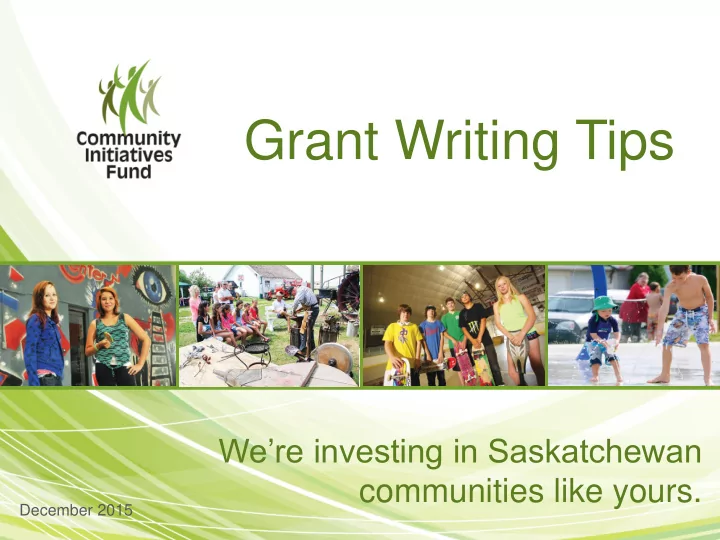

Grant Writing Tips We’re investing in Saskatchewan communities like yours. December 2015
Before you begin — Know Thyself! • Prepare, before sitting down to complete your funding application. • Clearly understand your organization’s mission, objectives, audience, and role in the community. • Honestly evaluate your organization’s strengths, challenges and capacity to deliver a program or complete a project. • Be able to articulate your organization’s “value - add” – what is unique about your organization, what gives you credibility in your community?
Before you begin — Plan • Organizations typically have broad organizational or strategic plans. • How does your proposed project “fit” or support achieving the plan? • Identify your project’s outcomes . What will be achieved and how will you evaluate to determine if outcomes are reached? • For ongoing programs, how will you ensure they are sustainable? Consider the funding, human resources, partnerships, … more.
Before you begin — Research • Identify potential funding sources with: • Alignment of goals and objectives between project and funder interests; • Match organization and/or program values; • Funding criteria such as eligible projects, expenses, timeframes, and more. • Understand each funder’s application process and requirements.
Before you begin — Build Relationships Potential Funders: • Call potential funders to discuss your idea in advance of the application process. • Maintain positive relationships with current or prior funders. Potential Partners: • Which other organizations could assist with program delivery? Consider those with similar audiences, special expertise, complementary programs, etc., and avoid duplication.
Common Elements of a Grant Application • Project Summary • Project Plan, • Introduction & Activities & Timeline • Budget Statement of Credibility • Definition of the Issue • Evaluation Plan • Intended Outcomes • Sustainability Plan • Conclusion & Results • Appendices
Project Summary • Although sometimes listed at the beginning of your application form, consider completing this section last. • Keep it brief – 1 to 2 paragraphs. • Be concise in addressing Who, What, Why, How, When and Cost of the project. • Litmus Test: If a person reads only the Project Summary…would they easily understand the project?
Introduction & Statement of Credibility • Describe applicant organization to establish eligibility and credibility as the “right” organization to be submitting proposal. • Include mission, organizational goals and relevant program achievements, if requested.
Defining the Issue • Describe the opportunity or challenge your proposed project will address. • Answer the question, “How do you know this is a need or issue in your community?” • Refer to community input, research, feasibility studies, etc.
Intended Outcomes & Results • What will be better and/or different because of your project? • Outcomes can relate to knowledge, skills, behaviour, and attitudes. • Be specific – statements should be measurable. • Answer the question, “So what?”
Project Plan & Activities • Describe the project and what activities will occur. • What will you do? • How will you do it? • Where will it take place? • Who will participate? • When and how often will it happen?
Budget • Must relate directly to the description of the project. • Base your estimates on actual costs, quotations, etc. • Check for accuracy. • Demonstrate clearly what the requested funds will pay for. • Base your request on funder criteria.
Evaluation Plan • How will you know your project accomplished the intended outcomes and results? • Describe what will be measured, how it will be measured, and what will be done with the results.
Sustainability If the project is intended to be repeated or continued, how will resources be secured to sustain the project?
Conclusion • Summarize “the ask” • What is the funding amount you are requesting? How will it be used to support the project? • Emphasize how the request fits with the funder’s criteria and objectives.
Appendices • Provide additional information, as required, for the application. • Often includes letters of support, financial statements, annual reports, more. • Do not provide information that is not required.
Additional Tips • Use the correct • Use plain language. • Do the math correctly! application form. • Follow directions. • Budget accurately. • Brevity is best. • Include other funders • Individualize to the and/or requests. • Avoid mission drift. specific funder. • Don’t use jargon. • Do the follow-up. • Answer the question. • Focus on relationship.
RESOURCES
Community Initiatives Fund • www.cifsask.org • Rhonda Newton, Grants Administrator • T: 306.780.9308 • E: rnewton@cifsask.org
Grant Writing Resources • Online Volunteer Training Centre – www.ovtc.sk.ca • Charity Village – www.charityvillage.ca • “Strategies for Effective Proposal Writing”, Ontario Healthy Communities Coalition – www.ohcc-ccso.ca/en/publications • Google: “grant writing resources.”
Recommend
More recommend